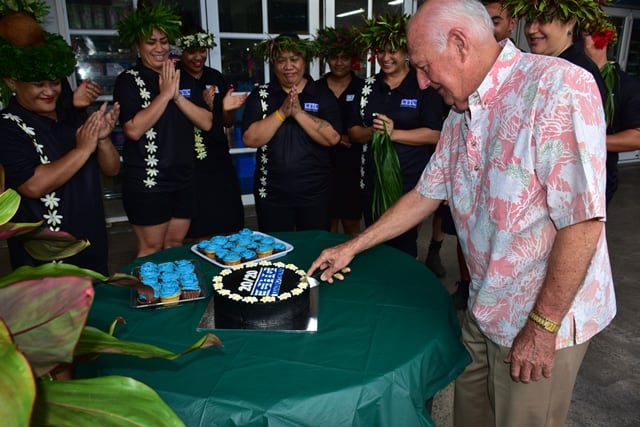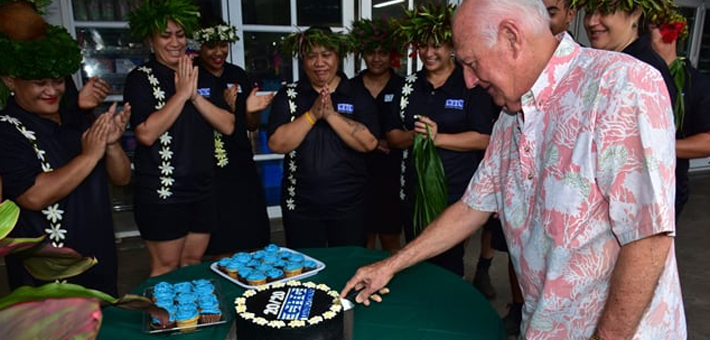I’m picking Robin Bullen is a bit of a character.
 You can see it in his mercurial smile and his eyes. There’s a hint of mischief – well, fun anyway. But there’s a lot of knowledge there too, and I’ve come to talk to him about what those eyes have seen over the past half a century or so since he arrived here from New Zealand in 1965. Bullen arrived during the dying days of New Zealand’s colonial rule over these islands.
You can see it in his mercurial smile and his eyes. There’s a hint of mischief – well, fun anyway. But there’s a lot of knowledge there too, and I’ve come to talk to him about what those eyes have seen over the past half a century or so since he arrived here from New Zealand in 1965. Bullen arrived during the dying days of New Zealand’s colonial rule over these islands.
He was a staff member of the then Island Territories Department of the New Zealand Public Service, and his initial posting was for three years. It was extended to six years and then nine. By then he’d married Kura Short and they had four children.
He agonised about returning to a public service job in Wellington. That option was open to him, but the thought of moving to a state house in Porirua and the cooler weather didn’t appeal. Instead, he joined CITC. “I became the office manager,” he says. “Everyone thought I was an accountant, but I’m not. I didn’t even study bookkeeping. My background was in clerical work.”
Bullen has a wealth of knowledge about CITC, which back then was owned by the McKegg family.
Robert (Boss) McKegg was Canadian and dropped in here on a passing ship on its way to New Zealand in the early part of last century. He fell in love with the place and stayed. He had a few bob and in 1916 he bought Cook Islands Trading Company, one of two trading companies here at the time. The other was AB Donald.
In the early days, the trading companies did actually trade. They transported goods in their own ships to the outer islands and purchased copra, pearl shell and oranges, which they then exported overseas.
Boss McKegg had two sons – Henley, born in 1921 and Neil, born in 1931.
Henley was sent off to school in New Zealand at the age of five. He was groomed from an early age to take over the company. Neil, on the other hand, remained here living an idyllic island life, largely unschooled and following his father around. Schooling caught up with him when in 1939 because of the difficult economic times of the Great Depression, the family moved back to Christchurch, leaving CITC under a manager.
While Neil was undergoing his education in various prestigious New Zealand schools, his older brother Henley joined the air force and fought in the Second World War, rising to the rank of flight lieutenant and winning a Distinguished Flying Cross for his bravery.
After the war the plan was still that Henley would take over after his father. Boss McKegg died in 1958, and Henley tragically followed him just three years later. He was only 39 years old. Suddenly, Neil McKegg was back in the frame. By now he was a successful lawyer with a law practice in Auckland when he became the new boss.
While Neil McKegg travelled back and forth between Auckland and Rarotonga, he largely oversaw the business from Auckland, with mixed success. But in the late 1960s, in something akin to a coup d’etat and providing plenty of room for intrigue, he took over his main competitor in the Cook Islands, AB Donald, with financial help from one of the great taipan trading companies in Hong Kong, Jardine Matheson.
Robin Bullen watched all of this unfold in the sixties. He recalls how quiet the place was in many ways. There were no tourists. Travel was still difficult and was by sea, but there were still substantial populations on the outer islands. CITC had branches on them all and supplied them with goods using the company’s own boats.
When Trevor Clarke took over CITC in 1998, Bullen was still there and had risen to the rank of general manager. Having witnessed the huge political changes of the 1960s, he also recalls the commercial changes that took place once Trevor Clarke took over.
 “From the word go Trevor began reinvesting profits rebuilding the company, which had been so rundown. It took an awful lot of money and Trevor has done an excellent job of rebuilding it to what it is.”
“From the word go Trevor began reinvesting profits rebuilding the company, which had been so rundown. It took an awful lot of money and Trevor has done an excellent job of rebuilding it to what it is.”
Bullen self-effacingly reckons much of the modernisation introduced since Clarke took over 20 years ago was beyond him and his clerical background, making him believe he was past his “use-by-date”. But clearly people have other thoughts, because while Bullen finally retired from CITC in 2004, he continues to be on the company’s board of directors.
Gaye Whitta is now the general manager of CITC and one of 20 employees who have been there for 20 years or more. She joined in 1997 as financial controller. She has a sort of no-nonsense approach, just the sort of thing you need in a general manager. It’s with some pride that Whitta and Clarke point out that about 97 per cent of the staff are Cook Islanders or married to one. Whitta was born in New Zealand but came here when she was two weeks old.
She joined CITC from the Airport Authority where she was financial controller. She reminisces that when she joined the company it had only four computers. Now there are more than 100.
 As a measure of the expansion that has taken place in the last 20 years, back then there was a staff of 100. Today, that number is 320. Whitta says: “We do hire the best person for the job, but we also go out of our way to find a Cook Islander if we can. And we give our people training for their personal development.
As a measure of the expansion that has taken place in the last 20 years, back then there was a staff of 100. Today, that number is 320. Whitta says: “We do hire the best person for the job, but we also go out of our way to find a Cook Islander if we can. And we give our people training for their personal development.
Some companies don’t like training people, fearing that after they have been trained they’ll leave. We believe that’s a risk worth taking, and in any case, because our training can attract New Zealand Qualifications recognition, we’re happy our people will have a qualification they can take forward with them.”
Darren Piri is an example of someone who came in at the bottom and worked his way up the executive ladder.
He was born in New Zealand but was brought here as a baby when his family came home. While he was growing up, he thought he would like to be an architect. But he ended up working with the Ministry of Agriculture in the veterinary services and the abattoir.
Then one night, while having a couple of beers, a mate asked him for his CV, and submitted it to CITC. He was invited to an interview and given two options, working in the office or the shop downstairs.
 He chose the office – that was in 1994. He was very much the office junior back then, working as a debtors clerk. But with the help of his co-workers and the company’s staff training process, he worked his way up. Today he is manager of the company’s administration team. Piri has been through the big changes the company has made over the past 20 years and greatly admires the progress Trevor Clarke has made.
He chose the office – that was in 1994. He was very much the office junior back then, working as a debtors clerk. But with the help of his co-workers and the company’s staff training process, he worked his way up. Today he is manager of the company’s administration team. Piri has been through the big changes the company has made over the past 20 years and greatly admires the progress Trevor Clarke has made.
“Trevor is upfront and shares his vision with his managers. He’s always looking for ways to improve.”
In 1997 Helen Matheson, who’s married to a Cook Islander, wasn’t working when her daughter, who was at CITC, mentioned they were looking for people to work in the office.
She applied and got the creditor clerk’s job. Today she’s the deputy administration manager. Matheson never thought she would still be there 20 years on, but she is, and is very happy. She’s seen big changes too, and all for the better – especially some introduced by Whitta when she took over as financial controller. Some of those changes have saved the company tens of thousands of dollars.
Matheson is also very proud of the company’s new stores, saying they are as good as any in New Zealand.
One big change has been the tracking system to follow the progress of goods through the stores from arrival – once it’s ascertained that the items actually did arrive – through to the point of sale.
 Matheson is particularly glowing in her comments about the way staff are looked after, which helps make CITC a great place to work. She talks about people being looked after when they’re ill, and about the socialising the staff do in order to meet their colleagues in the various divisions, as well as little things like recognising staff members’ birthdays.
Matheson is particularly glowing in her comments about the way staff are looked after, which helps make CITC a great place to work. She talks about people being looked after when they’re ill, and about the socialising the staff do in order to meet their colleagues in the various divisions, as well as little things like recognising staff members’ birthdays.
George George reckons he’s been with the company about 30 years.
A trained surveyor, he was planning to head off to Bahrain with a Kiwi surveyor he’d gone into business with. Both had lucrative contracts to work there. But George’s wife was carrying their second child at the time, and Iraqi dictator Saddam Hussein was threatening his Middle East neighbours. George thought about it long and hard, and decided to stay here. Since then he’s gone on to become CITC’s key brands strategist. That means he’s out there promoting key brands like Coca Cola.
“I think I got the job because of my prominence in sporting and community circles,” he says.
George has seen CITC change from a colonial-style business to a very successful modern business.
“I admire Trevor’s vision and approach.”
 George likes the idea of getting out into the community, supporting people when there is a death in the village for example, and he believes the company supports that.
George likes the idea of getting out into the community, supporting people when there is a death in the village for example, and he believes the company supports that.
He talks about the way families work for CITC. His own son is in the IT section and he’s noticed other families with more than one member working there.
Whitta talks about Cook Islanders feeling happiest when they work as a group or family, but she often feels that can stunt their growth. So the company encourages people to gain qualifications and with confidence step up into other roles in the company.
George George still wonders what might have been if he had gone to Bahrain. His old partner did and it worked out very well. He is now comfortably retired. Bullen says of Clarke, “He’s not one to go down memory lane. He’s forward-looking, not backwards”. Bullen recalls how in the past Clarke has been cynical about environmentalists. With a chuckle he adds, “But he can change”.
“I notice in the budget there’s an amount set aside for environmental proposals. I put that down to Gaye’s influence.”
CITC is the biggest and most diverse business on Rarotonga. Technically you could arrive on these shores in the clothes you stand up in, with your passport and wallet or credit card, and from one or another of CITC’s outlets you would be able to purchase everything you would need for your stay.
Twenty years ago the CITC staff was 100 people. Twenty years later one fifth, or 20, of those people are still working there.




